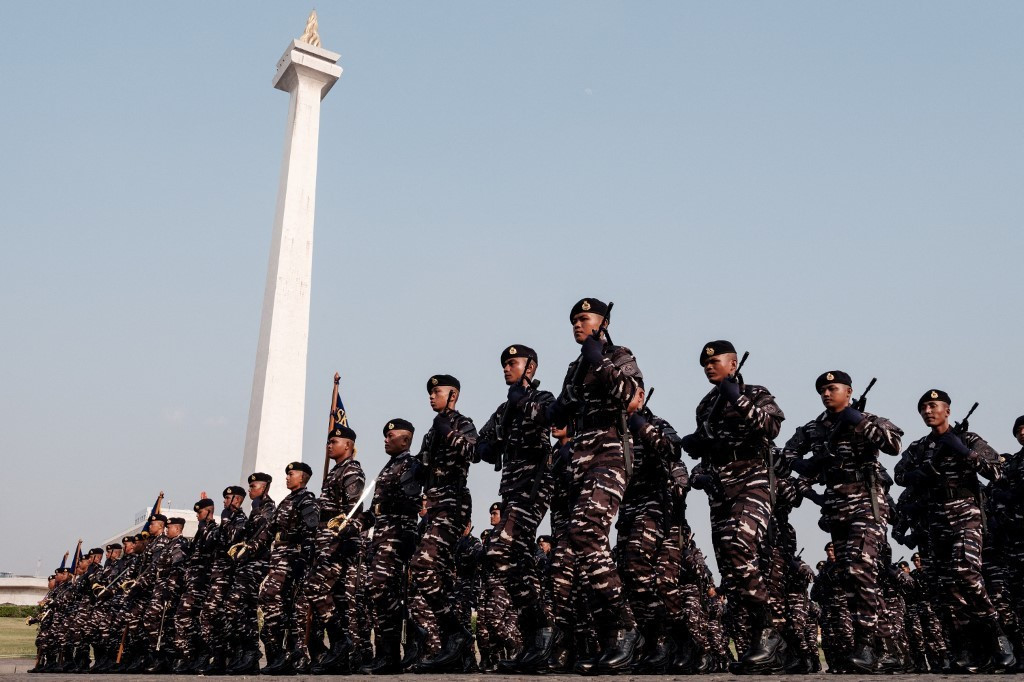News
To some, TNI anniversary’s show of force sends negative vibes
Tenggara Strategics October 14, 2025 Indonesian Navy personnel walk next to the National Monument (Monas) during the celebration of the 78th anniversary of the Indonesian Military (TNI) in Jakarta on Oct. 5, 2023. (AFP/Yasuyoshi Chiba)
Indonesian Navy personnel walk next to the National Monument (Monas) during the celebration of the 78th anniversary of the Indonesian Military (TNI) in Jakarta on Oct. 5, 2023. (AFP/Yasuyoshi Chiba)
Celebrating its 80th anniversary, the Indonesian Military (TNI) held a massive parade in Jakarta on Oct. 5, but amid growing concerns about the military intruding more and more into the political arena, the display of power may have sent the wrong message to some quarters about Indonesia’s democracy, already in peril.
The trend toward militarization grew under President Prabowo Subianto , a retired Army general. Since his inauguration in October 2024, he has brought in more military types into the government, restructured and expanded the size of the military, and now allowed TNI to handle internal security, which should be the domain of the National Police (Polri).
What little pushback there is has primarily come from students and civil society organizations, which have raised the alarm of the nation heading back toward authoritarianism.
The fiesta with thousands of people at Monas Square opposite the Presidential Palace, after Sunday’s parade, however, attested to the TNI’s popularity. The parade’s theme, “TNI Prime, TNI People, Indonesia Progresses,” went down well with the public.
The parade is said to be the biggest in the TNI’s 80-year history, involving more than 133,000 personnel from all three services, Army, Navy, and Air Force, and displaying their collection of modern weapons. They also demonstrated various skills like aerobatics, parachuting, and the use of martial arts in handling domestic disturbances.
The parade was aimed at the domestic rather than international public and potential foreign aggressors. It is public knowledge that the TNI still falls short of meeting the minimum essential force (MEF) required to be able to defend the country’s territorial sovereignty.
For much of the past 15 years, the TNI had focused and invested in building its strength to reach the MEF, but because of financial constraints, it had only reached less than 80 percent by the 2024 deadline. Since Prabowo took charge, this figure has not been made public as the TNI shifted its focus to dealing more with internal affairs.
This is despite Prabowo's warning, on more than one occasion, about the need for Indonesia to prepare for World War III. There have been skirmishes between the Indonesian Navy and China’s coastguards near Natuna Island in the South China Sea, an area Beijing claims to be its traditional fishing ground.
The creeping militarization is not lost among students and civil society groups. In the list of 25 demands that came out of the massive protests in August, one called on Prabowo to withdraw the TNI from all internal security operations, and another called for the military to return to the barracks.
Responding to these demands, Prabowo told a group of journalists that the TNI’s involvement is permitted by law, and then he asked rhetorically, “Who is going to protect the people?” A clear indication that he is not going to back off on the military march.
In March, the House of Representatives controlled by his coalition government endorsed a new TNI law which extended the military retirement age to 55 for soldiers and up to 65 years for officers, and allows active military officers to take up posts in 16 civilian institutions, up from 10 previously.
But even outside these 16 institutions, long-or-recently retired TNI officers are taking up other civilian jobs. For example, the new National Nutritious Agency (BGN), set up to run the free nutritious meal program for all 83 million school children, is filled with former military officers. The military also runs some of the kitchens and distribution facilities of the free meal program, considered Prabowo’s signature policy to fight against stunting.
In August, the TNI inaugurated six new Army territorial commands (Kodam), bringing their total to 21. These commands are spread throughout the archipelago, making sure the military presence is felt among the population. The students’ demand for the “return to barracks” calls for their rollback. The Army is also in the process of creating 100 new battalions, with recruits getting civic affairs training such as farming and animal husbandry, besides military skills, as part of its contribution to enhance national food security.
At the peak of the turmoil in August, Prabowo gave the green light for the military to take the lead in cracking down on protests against inequality and police brutality, as police were overwhelmed and became targets of violence. The military role in internal security looks like it is becoming a permanent feature.
Prabowo runs his expanded cabinet of more than 100 ministers and vice ministers with a strong military discipline. As part of their initiation in October last year, they were all sent to a three-day military boot camp. The big tent coalition government may represent different political parties and special interest groups, but the President uses carrots and sticks to command their loyalty.
What we've heard
Defense Minister Sjafrie Sjamsoeddin has proposed a budget of Rp187 trillion, combining the allocations for the Defense Ministry and the TNI. A lawmaker familiar with the proposal said the huge military budget is due to Prabowo’s plan to expand the TNI’s command structure and increase the number of troops. “Organizational development requires additional funding,” the lawmaker said.

